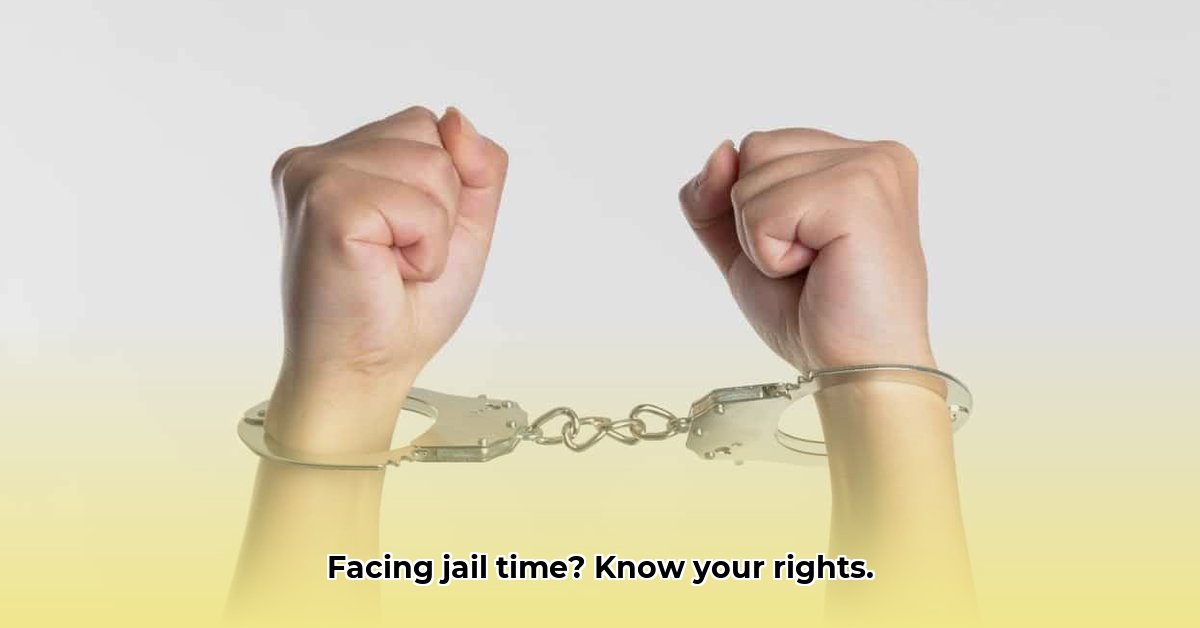
Facing the possibility of jail time is terrifying. It's natural to feel overwhelmed and anxious. This guide provides clear, actionable steps to help you navigate this difficult situation. Remember, this is for informational purposes only and isn't legal advice. Always consult a lawyer for personalized guidance.
Understanding the Charges Against You
The first step is understanding the specific charges. What crime are you accused of? This distinction is crucial. A misdemeanor (less serious offense) carries less severe penalties than a felony (more serious offense). Felonies often mean significant prison time, while misdemeanors may result in fines or shorter jail sentences. Ask questions until you fully grasp the accusations against you. Clarity is essential.
The Importance of Legal Representation
Facing criminal charges is incredibly stressful. Do not attempt to navigate this alone. A skilled attorney is your essential guide through the complex legal system. They protect your rights, negotiate on your behalf, and represent you in court. They can explain your options, explore plea bargains, and advise on the best course of action. Securing legal representation immediately is critical.
Navigating the Bail Process: Securing Your Release
If arrested, you'll likely have a bail hearing. This determines your release before trial. The judge considers the charge severity, your criminal history (if any), and the risk of flight. Bail might be cash, property, or a bond from a bail bondsman. Your lawyer will advocate for your release, presenting reasons for your pretrial freedom. The bail hearing outcome significantly impacts your immediate situation.
Plea Bargaining: Evaluating Your Choices
Plea bargaining involves negotiating with the prosecution to plead guilty for a reduced sentence. This can avoid a trial's uncertainty and cost. Your lawyer will weigh the pros and cons: a shorter sentence versus the chance of acquittal at trial. This decision requires careful consideration of potential outcomes.
Sentencing Following a Conviction
A guilty verdict (through plea or trial) leads to sentencing. The judge considers the crime's nature, your background, and any mitigating or aggravating circumstances. Sentencing may involve jail time, probation (community supervision), fines, or community service. Your criminal history significantly impacts the sentence. The judge might also consider alternative sentencing programs.
Post-Sentencing Options: Appeals and Beyond
A jail sentence doesn't necessarily end the legal process. Appealing the sentence is often possible, and this complex process usually demands legal expertise. If incarceration occurs, focus shifts to preparing for life in a correctional facility and planning for reintegration into society after your release.
Practical Steps for Preparing for Potential Incarceration
If facing potential jail time, proactive steps minimize stress. Manage your finances, arrange for dependents' care (if necessary), and inform your employer. Gather essential documents and organize your affairs. Proactive planning reduces anxiety and facilitates a smoother transition if jail time becomes a reality.
Alternative Sentencing: Avoiding Jail
Jail isn’t the only outcome. Alternatives include probation, community service, house arrest, or rehabilitation programs. Your lawyer will explore every option to achieve the most favorable sentence, even if that means avoiding jail time entirely.
Seeking Support: You're Not Alone
Navigating the legal system is challenging. Many organizations offer support and resources. Don't hesitate to seek assistance; these resources provide invaluable guidance and aid during this difficult time.
Understanding the Unpredictability of Outcomes
Predicting incarceration is complex. The charges' severity, your history, the evidence's strength, and judicial discretion all play significant roles. While some cases are straightforward, others are intricate and unpredictable.
Key Takeaways:
- Understanding the legal process is crucial for making informed decisions.
- Securing legal representation immediately is essential.
- Exploring all available options, including plea bargains and alternative sentencing, is vital.
Remember, this information is for educational purposes, and you must consult a qualified legal professional immediately for personalized advice tailored to your specific circumstances.